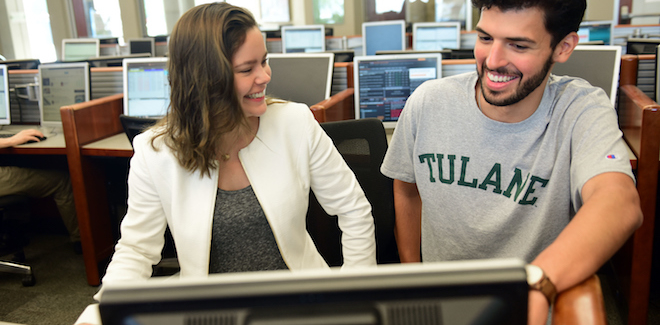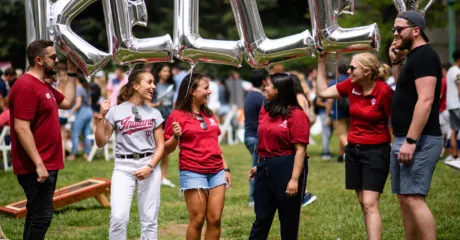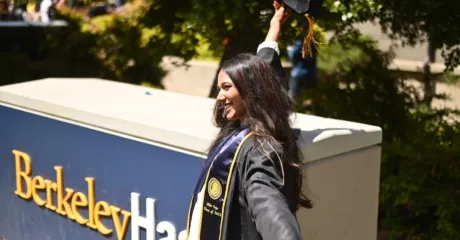Tulane University’s Freeman School of Business impressively landed at No. 31 in this year’s 2023 rankings, maintaining their same place as last year. Freeman had hovered right around the low 40’s for the previous few years — yet now they are holding steady in the 30’s.
The B-school has decreased their admissions selectivity slightly, from last year’s 12.86% acceptance rate to 15.10% for this year’s most recent incoming class. The average SAT score of this year’s incoming students was 1400 – lower than last year’s average of 1430. The Admissions Standards was Tulane’s most competitive methodological category, where they placed 14th overall.
Employment-wise, Freeman saw a drop this year, with 77.31% of the Class of 2023 securing full-time employment within three months of graduation – down from last year’s 89.22% for the Class of 2022. Internship outcomes however rose over 10%, with 46.60% of the Class of 2023 landing a business-focused internship before graduating compared to 36.10% for the Class of 2022.
FLEXIBLE INTERDISCIPLINARY EDUCATION
One of the key characteristics of the Freeman education is the academic freedom and flexibility it offers students. Tsetsa Dankova Rosensteel, the Assistant Dean of Administration and Finance at Freeman, describes it best: “One College. Five Schools. No Boundaries.”
Each student can choose to attend any of the five schools (Liberal Arts, Science and Engineering, Freeman School of Business, Public Health, and Architecture) that serve undergraduates.
The B-School offers joint programs, the most popular being the Bachelor of Science in Management (BSM) and the Master of Accounting Program (MACCT) which they can complete in five years, with the option in spring of the senior year to complete a “busy season internship.”
This flexible, interdisciplinary approach is the core of the Freeman education. Many other B-Schools have barriers with admissions or prerequisite requirements that make it difficult for students to cross academic boundaries but at Freeman, students are given more freedom and flexibility.
NUMEROUS REAL-WORLD OPPORTUNITIES
There isn’t just one cornerstone experience at Freeman. Alumni we surveyed reported a variety of hands-on, real-world opportunities that they say were key to their business education. Roughly 85.07% of surveyed alumni reported that their first career after graduating was in their desired industry.
One example is the Burkenroad Reports program where each year, 200 Freeman students are divided up into teams to follow companies. Teams meet with top management, visit company sites, design financial models, and publish in-depth, unbiased investment research reports. The companies researched are “stocks under rocks” – companies. In the spring, top management of participating companies present the outlook for their companies and industries to an audience of nearly 800 individual and institutional investors.
“Burkenroad gave me the opportunity to understand equity research on a real-world analyst level, including meeting with C-level executives of the companies we were tasked with researching,” one alumni told us.
But the Burkenroad Reports program is just one of many real-world opportunities at Freeman. Alumni we surveyed highlighted the plethora of opportunities they had to apply their studies to the real world.
“I had a real-world consulting client for my management consulting class senior year (a local restaurant) and was able to make changes to a real business and see the impacts instead of simply reading case studies,” another alumni told us.
At Freeman, students are given an open runway to go out and explore their passions and interests. If a student is interested in chemical engineering and business, he or she can pursue that. If a student wants to start taking business classes in the first year, the student can do so freely. With a flexible, interdisciplinary-focused education and plenty of opportunities to learn in the real world, Freeman students can truly explore and pursue everything and anything.
Alumni say:
“I had many signature experiences in my time at Tulane. Just to name a few, we ran social media simulations, I worked with real small businesses in my management classes, and I presented a marketing pitch to a real small business in one of my senior year marketing classes.”
“I participated in the student venture accelerator and was able to launch my own startup and walk through the entire process of starting a business. That experience directly led to me getting a job in the same industry (financial wellness) at a startup that I love.”
“We got to embrace ourselves in the athletic departments world. We were figuring out ways to increase audience and engagement with Tulane athletics. We were able to meet with marketing directors at the Saints and Pelicans to learn what was successful for them and helped implement traditions that are still used today.”
“Capstone included simulation requiring you to become the management team for a company of the teachers choosing. My team was then forced to develop a growth plan for the business, address any hurdles, and present a pitch to the class in a competition to determine the best business plan.”
“The professors at Tulane for the most part really want to help their students and will take the extra time to meet with students to go over either work or personal/career matters.”










